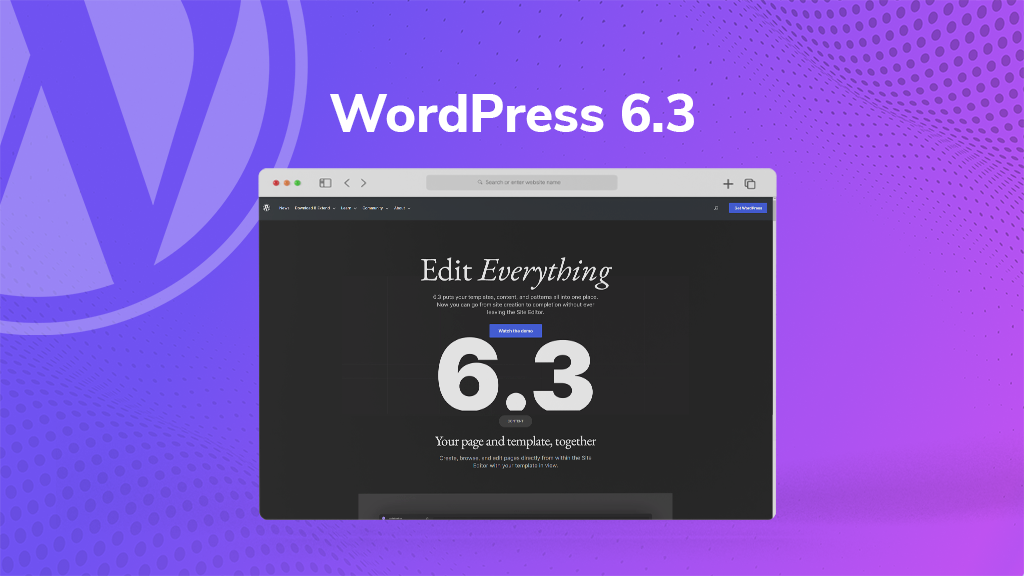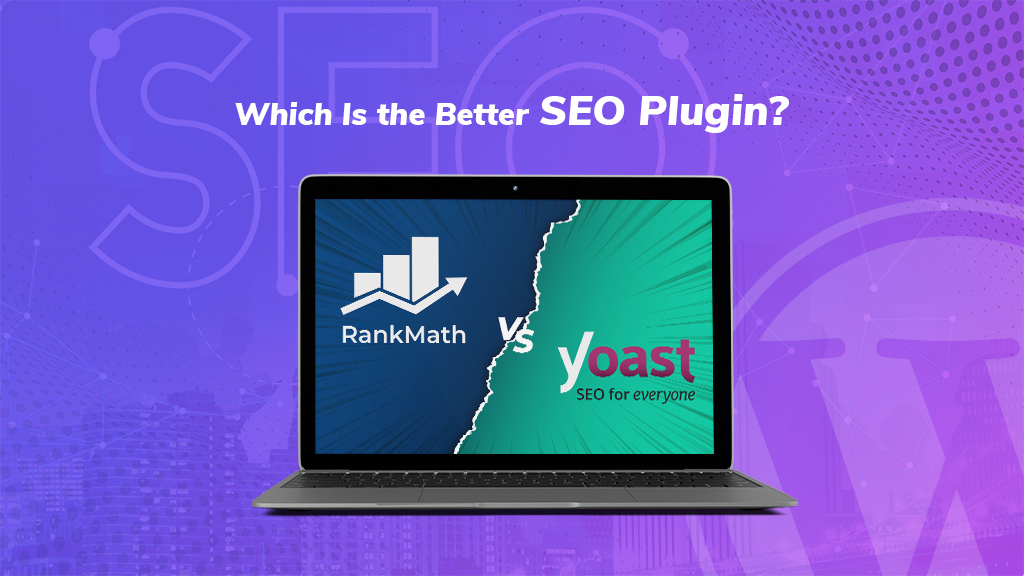
Introduction
1. Importance of SEO plugins
In the digital age, where online visibility can make or break a business, mastering Search Engine Optimization (SEO) has become paramount. SEO plugins play a pivotal role in this endeavour, aiding website owners in enhancing their content’s discoverability and ranking on search engines. In this comprehensive analysis, we delve into the world of two renowned SEO plugins, Rank Math and Yoast SEO, to determine which one reigns supreme.
2. A brief overview of Rank Math and Yoast SEO
Before we embark on our journey to assess these plugins’ prowess, let’s briefly acquaint ourselves with our contenders. Furthermore, Rank Math and Yoast SEO are two heavyweight champions in the realm of SEO. Both plugins have garnered immense popularity and have helped countless website owners optimize their content for search engines.
i. Rank Math SEO Plugin
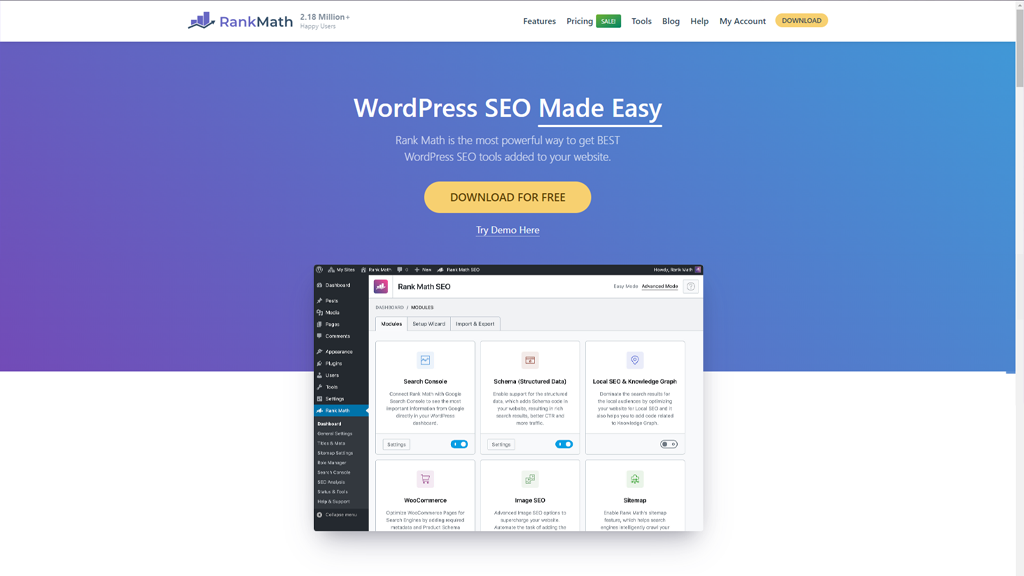
With over 2.18 Million websites already benefiting from its power, Rank Math SEO Plugin has surely become a top choice for WordPress users looking to boost their site’s performance. It works seamlessly with WordPress versions 5.6 and above, providing a wide range of tools to improve search engine visibility and enhance the overall user experience. One standout feature is its integration of Artificial Intelligence (AI), giving you data-backed insights to supercharge your optimization efforts. Rank Math covers all the essentials of website SEO, from on-page tweaks to XML sitemaps and schema mark-up.
ii. Yoast SEO Plugin
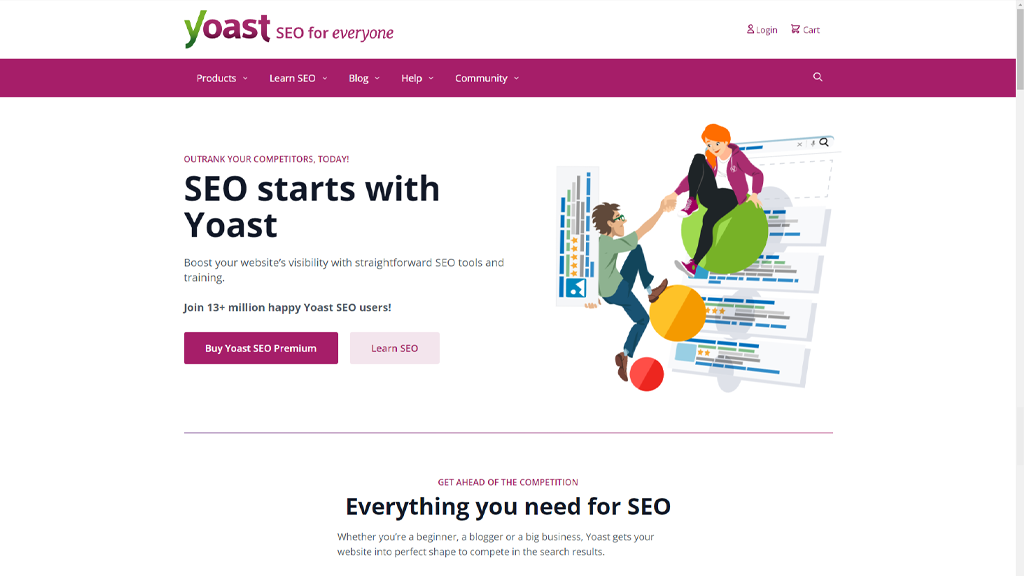
With a whopping 13+ million active installations, Yoast SEO Plugin is a heavyweight contender in the world of WordPress plugins. Compatible with WordPress versions 6.1 and higher, it’s a trusted tool for elevating your website’s SEO game. Yoast SEO indeed offers features like XML sitemap generation, content analysis, and seamless integration with social media. Its user-friendly interface and real-time content analysis make it a hit among both beginners and seasoned users, ensuring your website gets the SEO boost it deserves.
Quick Overview
| RankMath | Yoast SEO | |
| Ease of Use | Simple to navigate, user-friendly, and comes with clear instructions. | Very easy to understand with clear instructions and helpful visuals. |
| Setup | Offers an excellent setup with two preset options: Basic and Advanced Modes. | Setting up is straightforward and suitable for everyone. |
| Keyword Optimization | Permits one keyword per page or post and includes up to 5 site keywords in the free account. | Allows one keyword per page or post; additional site keywords require a paid subscription. |
| Popularity | Ranks as high as #3 in popularity within just a few years. | Has held the top spot #1 for years. |
| Review | RankMath got a solid 4 stars! | It got a perfect 5 stars! |
| Pricing | Free for one site; $59 for unlimited personal sites; additional options for businesses and agencies start at $429 for 100 websites. | Free for one site; $99 per site for the Pro version, with package deals available for multiple site owners. |
Comparison of key features offered by Rank Math and Yoast SEO
Let’s delve deeper into our comparison of Rank Math and Yoast SEO by exploring the features of each plugin.
A) Rank Math
1. Free Features
i. SEO Titles and Meta Descriptions
You can uniquely create templates that automatically apply to your content and fine-tune SEO titles and descriptions for individual pieces of content.
ii. Social Media Descriptions
Firstly, take control of how your content appears on Facebook and Twitter, including the text and images.
iii. Focus Keyword Analysis (Supports Multiple Keywords)
Above all, enter one or more focus keywords to gauge how well your content is optimized for those specific terms.
iv. XML Sitemap
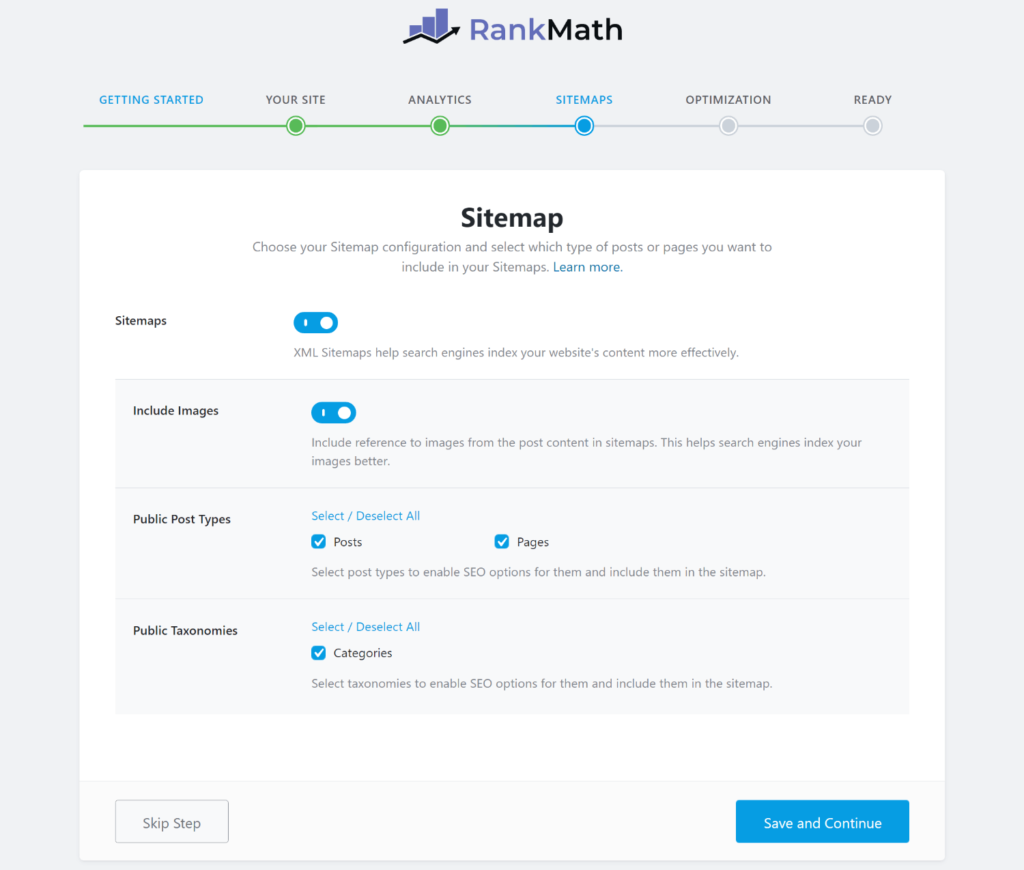
Customize your XML sitemap more extensively than the default WordPress sitemap allows.
v. Structured Data/Schema
Implement schema markup across your entire site so that you have the flexibility to control it for individual pieces of content.
vi. Search Console Integration
Seamlessly connect your website to Google Search Console which not only allows you to automatically submit sitemaps but also can access Search Console analytics within your WordPress dashboard.
vii. Local SEO and Knowledge Graph
Moreover, Optimize your website for local SEO (note: free version supports one location).
viii. Image SEO
Enhance image SEO by automatically setting alt and title tags for your images.
ix. Internal Link Suggestions
While you’re editing, Rank Math suggests other content on your site that you can link to and improve the user experience.
x. Breadcrumbs
Add breadcrumbs to your site so that makes it easier for visitors to navigate.
xi. Link Counter
Keep track of the number of internal and external links, particularly in your content.
xii. Redirections
Create and manage 301 and 302 redirects, which ensures a smooth user experience.
xiii. 404 Monitor
Monitor your site for 404 errors, and if they occur frequently, you can redirect users to other relevant pages on your site.
xiv. Google Analytics
Easily add the tracking code and access valuable information about your site’s performance.
xv. Basic WooCommerce SEO
Optimize product and shop titles and descriptions to boost your online store‘s visibility.
2. Premium Features
Keyword Rank Tracking
Monitor your site’s search engine rankings and keyword performance over the past year, a feature that’s quite unique.
i. Google Trends Integration
ii. Google Video SEO Sitemap
iii. Google News SEO Sitemap
iv. Multiple Locations for Local SEO
v. More Pre-defined Schema Types (20+)
vi. Google AdSense Earning History
vii. Automatically Watermark Social Media Images
B) Yoast SEO
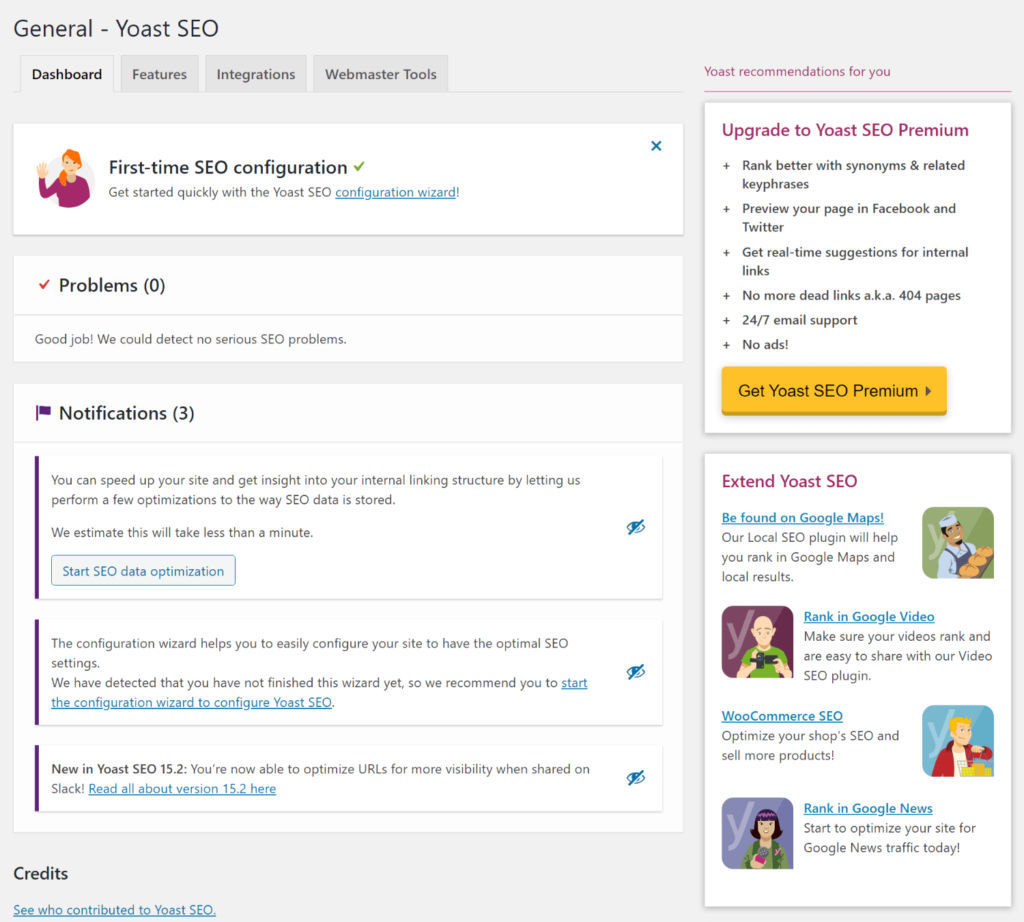
1. Basic Features
i. SEO Titles and Meta Descriptions
Easily create templates for SEO titles and Meta descriptions, or customize them manually for each piece of content.
ii. XML Sitemap
Tailor your XML sitemap to your specific needs, offering more control over how search engines crawl your site.
iii. Focus Keyword Analysis
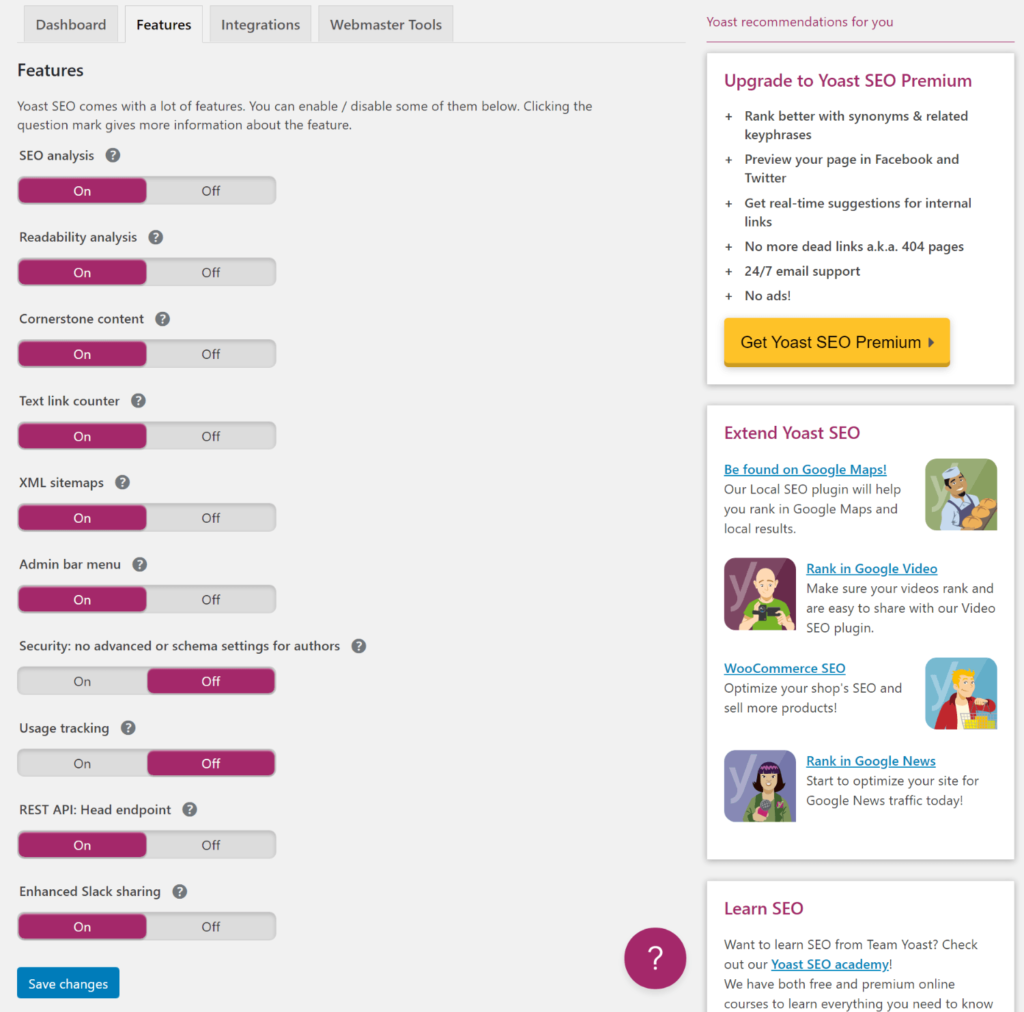
Optimize your content around a single chosen keyword to improve its visibility in search results.
iv. Sitewide Schema
Implement schema mark-up across your entire site, enhancing its presentation in search results.
v. Content Schema Type
Customize schema types for individual pieces of content, allowing you to provide more context to search engines.
vi. Search Console Verification
Seamlessly verify your site with Google Search Console, which helps you monitor and manage your site’s performance.
vii. Social Media Descriptions
Take charge of how your content appears on social media platforms like Facebook and Twitter, including text and images.
viii. Basic WooCommerce SEO
Enhance the SEO of your WooCommerce store by setting titles and descriptions for products and shop pages.
ix. Cornerstone Content
Identify and mark important pages as “Cornerstone,” signaling their significance for optimization and generating more internal links to them.
x. Breadcrumbs
Improve navigation on your site by adding breadcrumb trails, making it easier for visitors to find their way.
xi. Link Counter
Keep track of internal links within your content, helping you maintain a well-structured site.
2. Core Premium Features
i. Redirect Manager
Seamlessly create and manage 301 and 302 redirects, ensuring users always land on the right pages.
ii. Internal Link Suggestions
Receive recommendations for internal links, boosting user engagement and navigation.
iii. Internal Link Blocks
Automatically include relevant internal links within your content, saving you time and improving user experience.
iv. Multiple Focus Keywords
Analyze your content for multiple focus keywords, allowing you to optimize for a wider range of search terms.
v. Related Keyphrases
Generate related keyphrases using data from SEMrush, helping you discover additional keywords to target.
Yoast SEO also provides additional paid add-ons to address specific SEO needs. These add-ons offer features that are mostly available in Rank Math’s premium version:
1. Local SEO
Enhance your site’s local SEO by adding structured data for local businesses, improving your contact page, and supporting multiple physical locations.
2. Video SEO
Ensure your videos appear in Google Videos and apply other video SEO enhancements.
3. News SEO
Optimize your site for Google News, create an XML News sitemap, and more to improve your site’s visibility in news search results.
4. WooCommerce SEO (Advanced)
Access advanced WooCommerce SEO features like social media graph information and a cleaner XML sitemap to boost your online store’s performance.
Ultimately, the choice between Rank Math and Yoast SEO comes down to whether you’ll make effective use of the features each offers, considering your specific website needs.
Rank Math vs. Yoast SEO: Setting Up Your SEO Plugin
When it comes to getting started with Rank Math and Yoast SEO, both plugins offer a user-friendly onboarding experience. Hence, they guide you through essential settings, making it easy for beginners to dive into SEO.
i. Rank Math
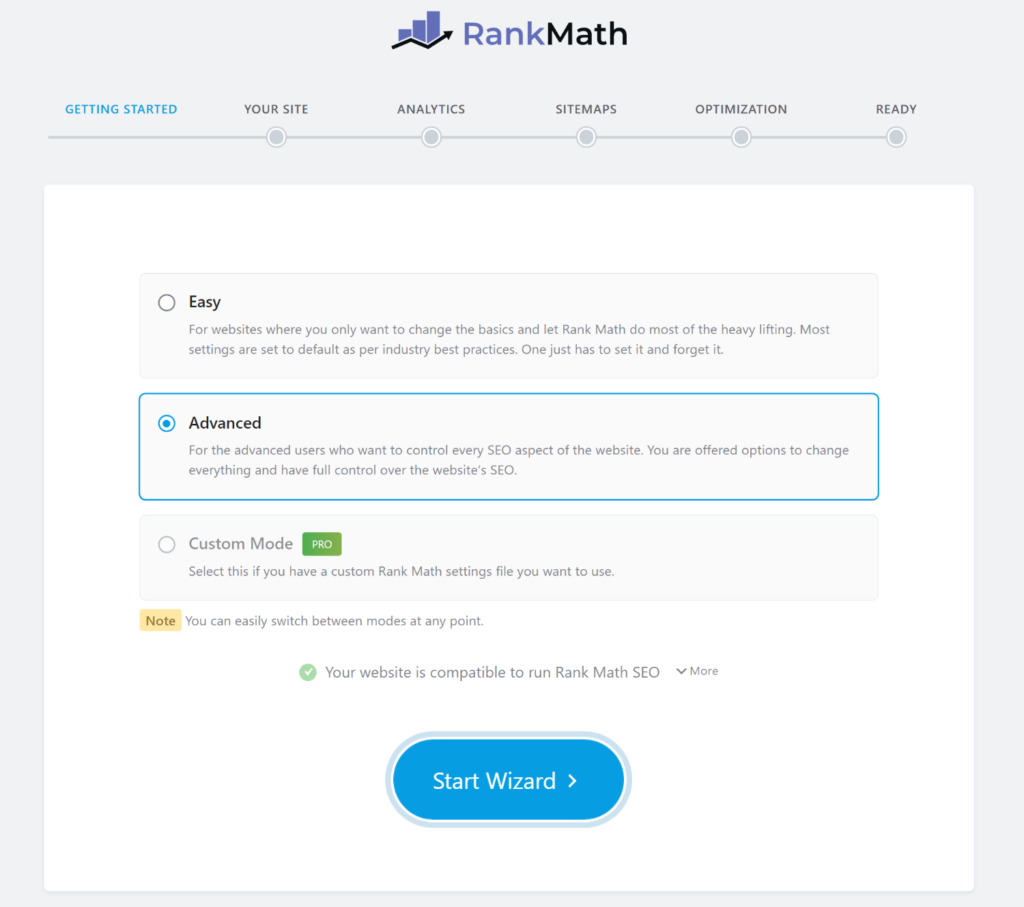
- Rank Math greets you with a setup wizard upon installation. It helps you configure crucial basic features.
- Optionally, you can connect a free Rank Math account to unlock additional features. This step is not mandatory but grants access to all plugin features.
- The wizard caters to both basic and advanced users with customized experiences.
- In the setup wizard, you’ll handle tasks like configuring basic schema information, integrating Google Analytics and Google Search Console (if desired), and setting up your XML sitemap.
- You can also adjust settings like whether to noindex empty categories and tag archives.
- After completing the initial setup, you have the option to dive into advanced options, unlocking additional features like role management, 404 error monitoring, and more detailed schema markup settings for different post types.
- Once done with the setup wizard, you enter the module manager. Here, you can enable/disable each feature and fine-tune their configurations. The modular approach keeps things flexible and user-friendly, with an option to switch to Advanced Mode for more control.
ii. Yoast SEO
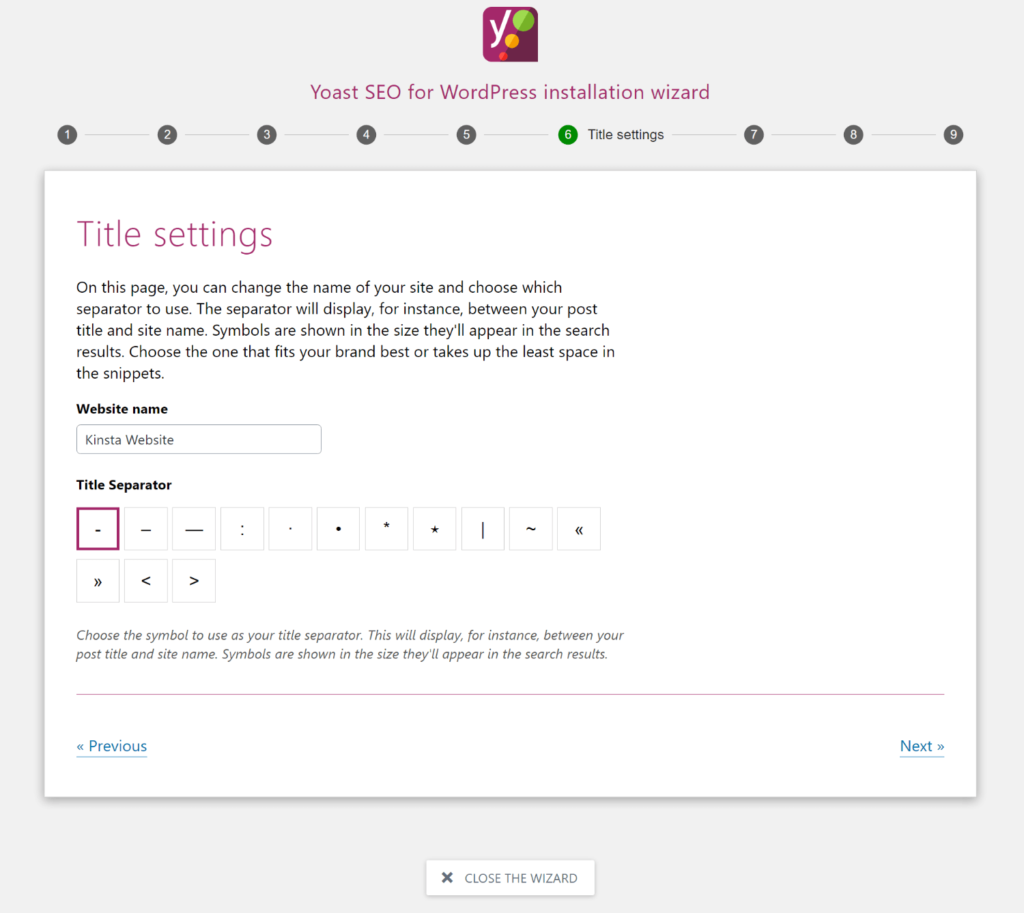
Yoast SEO also offers a configuration wizard, which you can access from the WordPress toolbar.
- This wizard guides you through vital settings, such as configuring basic site-wide schema data, deciding whether to index your site, and setting up SEO title templates.
- Yoast SEO’s dashboard provides tips and suggestions, highlighting potential issues with your site for easy resolution.
- Similar to Rank Math, Yoast SEO uses a modular approach. You can easily disable any features you don’t wish to use.
- In the Features tab, you can view all available features and toggle specific ones on or off based on your preferences.
Rank Math vs. Yoast SEO — User-Friendly Interface
Now, let’s take a closer look at how these plugins make your day-to-day SEO tasks a breeze and explore some unique features in their interfaces.
Rank Math
If you’re using the WordPress block editor (Gutenberg), Rank Math seamlessly integrates within it, ditching the traditional “meta box” style found in the Classic editor.
To access Rank Math settings, simply click on its icon in the Toolbar. Here’s what you can do within the settings sidebar:
1. General
Edit snippet details, set a focus keyword, and check content analysis.
2. Advanced
Configure the robot’s meta information explicitly, like adding a noindex tag.
3. Schema
Set up schema markup or structured data for search engines.
4. Social
In general, configure social graph information for platforms like Facebook and Twitter.
A standout feature of Rank Math is its Analytics interface, which offers insights based on your plugin version:
5. Search Console Reports (Free)
In fact, gains insights into search impressions and keyword positions.
6. Keyword Rankings/Performance (Paid)
Track your keyword rankings and performance, especially with this plugin.
7. Traffic Statistics from Google Analytics (Paid)
Get access to website traffic data from Google Analytics, matched with SEO scores for each piece of content by all means.
Yoast SEO
Yoast SEO offers two ways to handle SEO information while editing individual content:
1. Meta Box
This familiar “old-school” approach appears below the editor, available in both the block and classic editors. If you prefer the Meta box style, Yoast SEO has got you covered significantly.
2. Sidebar (Block Editor)
If you’re using the block editor, you’ll find a Yoast SEO option in the editor’s sidebar. Here’s what you can do within this single column:
3. SEO
Set titles and descriptions, review keyword analysis, and manage advanced settings like robot tags and canonical links.
4. Readability
You can access tips notably to improve your content’s readability.
5. Schema
Overall, select a schema type for your content to enhance its presentation.
6. Social
Configure open graph information for Facebook and Twitter.
In the sidebar, you can expand each section for more details and even preview your snippet information in a popup window.
Alternatively, if you prefer the Meta box approach, it provides four columns for your settings:
Both Rank Math and Yoast SEO aim to make managing your content’s SEO a breeze, and you can choose the interface that suits your preferences best. Whether you prefer Rank Math’s integrated approach or Yoast SEO’s versatile options, both plugins offer user-friendly experiences to enhance your website’s SEO.
- SEO: Set titles and descriptions, analyze keywords, and control advanced settings.
- Readability: In the meantime, check readability analysis tips.
- Schema: Choose a schema type for your content.
- Social: Configure open graph data.
Rank Math vs. Yoast SEO — Analyzing Keywords
Both Rank Math and Yoast SEO offer keyword analysis tools to help you optimize your content. These tools explicitly let you add the target keywords, and then the plugin evaluates your content to suggest improvements. However, there are some differences between the two in terms of capabilities and presentation.
Rank Math
- Even in the free version, Rank Math allows you to analyze up to five focus keywords simultaneously. You enter your desired keyword(s), and Rank Math provides:
- A score from 0-100, color-coded for easy understanding. Scoring above 80 turns the indicator “green,” indicating good optimization.
- A list of specific tips and whether you’ve met them. For instance, it checks if your focus keyword appears in the SEO title and how many times it’s used in the content.
- Rank Math’s suggestions cover various aspects, including on-page SEO and readability.
- You can switch between different keywords by clicking on them in the list, and the analysis adjusts accordingly.
Yoast SEO
- In the free version available at WordPress.org, Yoast SEO allows you to analyze only one keyword per piece of content. If you upgrade to the premium version, you gain the ability to analyze multiple keywords.
- As we’ve seen in the user interface sections, you can access the analysis tips in the sidebar of the block editor or in the meta box under the classic editor.
Yoast SEO’s analysis is similar to Rank Math’s, where you input your keyword(s) and receive a score. However, Yoast SEO’s score is less specific, using three categories:
- Green (good)
- Yellow (okay)
- Red (bad)
Yoast SEO keyword analysis
Yoast SEO also includes a separate readability analysis with its own scoring system. However, it’s important to note that the readability score can sometimes feel arbitrary. A small change in your content can result in a significant shift in your score. In general, it’s more valuable to focus on the specific readability tips rather than the overall score.
Pricing and Value for Money
Rank Math
Rank Math used to be exclusively free, but it introduced a Pro version in November 2020, expanding its feature set without affecting the existing free features. In other words, the premium version of Rank Math is generally more budget-friendly compared to Yoast SEO, and here’s why:
1. Lower Top-Level Prices
Currently, Rank Math’s premium pricing starts at $59 for the Pro version and $199 for the Business version. These are introductory prices marked as a “launch offer.” However, if Rank Math decides to charge the full list price in the future, it would be $129 for Pro and $429 for Business.
2. Unlimited Website Support
Rank Math’s premium plan allows you to use it on unlimited personal websites, whereas Yoast SEO charges separately for each site. This can result in significant savings, especially if you manage multiple websites.
3. Single Premium Plan
Rank Math offers a single premium plan that includes all the features. In contrast, Yoast SEO has multiple premium extensions, each requiring a separate purchase. For instance, if you want to add Local SEO support with Yoast SEO, that’s an additional cost.
Yoast SEO
Yoast SEO offers two main premium options:
i. Core Premium Plugin
This provides access to features like multiple keyword analysis, internal link suggestions, and more. It costs $99/year for use on a single site. Discounts are available for multi-site licenses.
ii. Premium Extensions
Yoast SEO also offers premium extensions tailored to specific SEO needs:
- Video SEO for WordPress: Starts from $79/year for a single site.
- Local SEO for WordPress: Starts from $79/year for a single site.
- News SEO for WordPress: Starts from $79/year for a single site.
- Yoast WooCommerce SEO: Starts from $79/year for a single site.
- You can also purchase all five plugins as a bundle for a total of $229/year.

Yoast vs. Rank Math: Which One Should You Pick?
After using both Yoast SEO and exploring all the features offered by Rank Math, I can confidently say that both are excellent choices for website owners. They work hand in hand with quality content to boost your site’s search engine rankings and attract more visitors. Here’s a breakdown to help you decide:
1. Choose Yoast SEO if
- You need assistance with both SEO and improving your content’s readability.
- Your website operates in a language other than English (Yoast supports 18 languages).
- You’re eager to learn more about SEO because Yoast offers free and paid courses that can be beneficial, especially for newcomers.
2. Choose Rank Math if
- You manage multiple websites, as Rank Math offers flexibility and support for multiple sites.
- You want to access a broader range of SEO features for free, allowing you to scale your efforts more affordable.
- You require more extensive global SEO options for your website.
Conclusion
In the final section of this comprehensive comparison, we draw definitive conclusions based on our thorough analysis of Rank Math and Yoast SEO. By considering all aspects, from features and performance to support and pricing, we guide you toward making an informed decision that aligns with your SEO goals and website ambitions.




